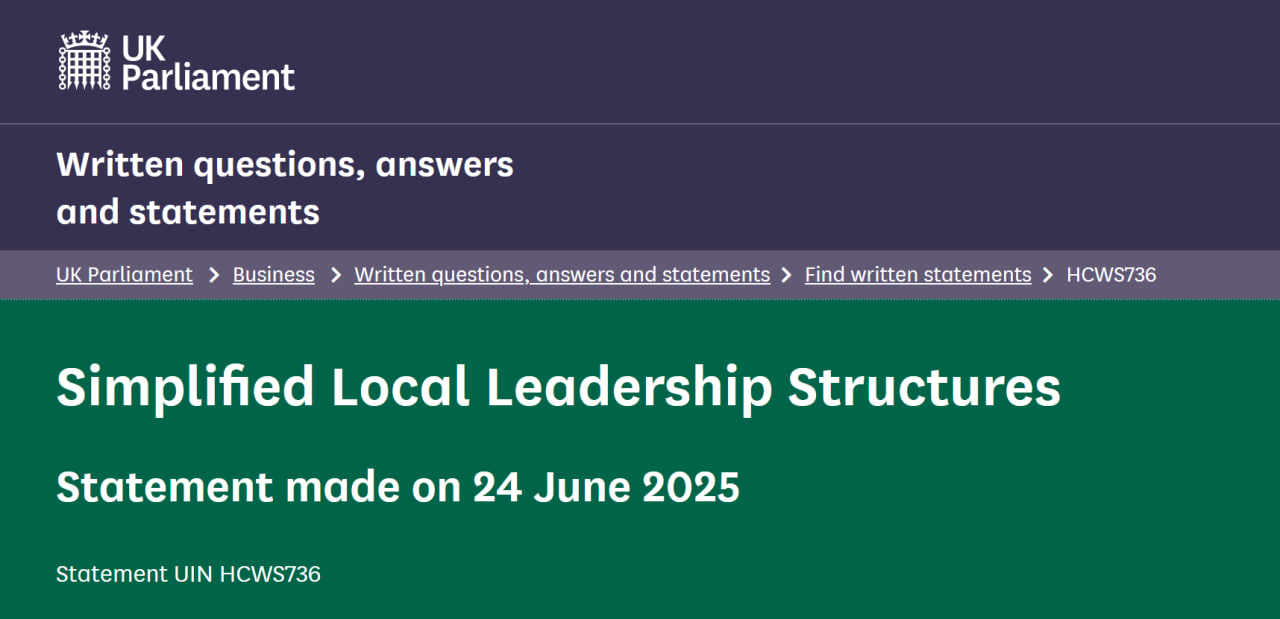Government capitulates to Heritage Party: No more Directly Elected District/Borough Mayors
On 24 June 2025, the Government unexpectedly announced a pause on the election of any new directly elected mayors at district and borough level until My 2027, along with stating its intention to legislate against the creation of any more. This comes after the Heritage Party officially joined the campaign against a new Directly Elected Mayor for Plymouth.

What changed?
We believe this decision is a direct response to sustained legal, civic, and democratic pressure led by the Heritage Party and concerned residents across the country.
This was not a goodwill gesture. It was a direct response to mounting legal and civic pressure — pressure we, the Heritage Party and our network of engaged residents, have been relentlessly applying for months.
What We Said in Our Formal Letters:
1. No Mandate = No Authority
We argued that councils cannot impose LGR without a binding public vote or lawful consultation.
– Government response: “We will pause any change processes… until Parliament considers the proposals.”
(Supported by: Letter to Minister McMahon,FOIs to councils nationwide , LDEDC Act 2009 citation)
2. Planning Structural Reform Requires Primary Legislation
We made clear that internal council votes or “bottom-up” claims have no legal standing.
– Government response: “The Government will introduce primary legislation… [and] prevent taxpayer money from being unduly wasted on administrative processes.”
(Supported by: Formal objection letters to councils nationwide)
3. Deadlines Are Arbitrary Without Legal Basis
We questioned the legitimacy of so-called deadlines for reorganisation set without statute.
– Government response: “The regulations will extend the period… and move the inaugural election from 2026 to 2027.”
(Supported by: FOI replies confirming absence of statutory basis for deadlines)
4. Democratic Oversight Is Non-Negotiable
We warned of “devolution by stealth” and asset disposal without informed public consent.
– Government response: “We will legislate to simplify governance… [and] prevent changes while Parliament considers the future of council structures.”
(Supported by: Heritage Party correspondence to Lords and Ministers)
5. False Narrative of ‘Bottom-Up’ Reform
We exposed how councils falsely claimed their initiatives were locally driven while following centralised guidance from Whitehall. We cited FOI evidence showing that decisions were based on DLUHC templates and Whitehall pressure, not resident demand.
– Government response: “Every place will benefit from our agenda to push power out of Whitehall…” — an inadvertent admission that the process was in fact top-down
.Loop of Blame: A Two-Faced Justification Strategy – Our FOIs revealed councils told Whitehall they were acting on local will to meet “bottom-up” criteria. Yet to residents, councils claimed they were merely following Government orders. This two-faced narrative allowed both tiers to dodge accountability – a deception we continue to expose. The Heritage Party is actively challenging this illusion wherever it persists.
(Supported by: FOI requests exposing DLUHC involvement)
6. Lack of Financial and Legal Justification
We questioned how reorganisations could proceed without demonstrating cost-benefit analysis or legal certainty.
– Government response: “This will… prevent the needless waste of taxpayer pounds.”
(Supported by: FOI responses including refusals confirming absence of financial impact assessments)
7. Risk of Arbitrary Imposition of Central Models
While we raised concerns about the chaos caused by multiple overlapping governance models, we never called for a nationalised imposition of one model. We warned against top-down enforcement of any new structure without consent.
– Government response: “We will abolish the committee system and require transition to the leader and cabinet model.”
(Note: We dont support this action )
Signs They Are Feeling the Pressure
- A full pause on changes means they recognised the risk of acting without public consent.
- They echoed our legal framing, suggesting internal fears of judicial challenge.
- The sudden change in tone (from assertive rollout to cautious legislation) suggests the pressure worked.
This is not a final victory — but it is a retreat.
What Happens Next
This pause offers a vital window. Councils cannot lawfully proceed with reorganisation until:
- Parliament passes new primary legislation, and
- The pause regulations are formally lifted.
Any attempt to continue reorganisation efforts now would be illegitimate and open to legal challenge.
But let us be absolutely clear: the reorganisation agenda must not be paused — it must be scrapped entirely.
No parliamentary process should be used to legitimise what is fundamentally a top-down restructuring model inspired by failed collectivist systems. It is incompatible with true democratic localism and individual liberty. We do not merely oppose how this reform has been rolled out — we oppose what it seeks to impose.
The Heritage Party will continue to lead the call for full cancellation of these ideological schemes and restore genuine local accountability.
We urge residents and councillors to demand binding referenda before any structural changes are considered. Let this moment serve as proof that strategic civic pressure can stop illegitimate reform — when it’s grounded in law, transparency, and genuine democratic principles.
The establishment doesn’t pause unless the ground beneath it begins to shake
No Mandate Means No Legitimacy
As Minister McMahon now publicly confirmed — both in Parliament and, previously, in response to our formal letters — there is no mandate to support reorganisation without due democratic process.
This admission validates our repeated warnings: there was no lawful mandate to cancel local elections, and no legal right for councillors whose terms have expired to remain in office.
Yet in multiple areas, former councillors — now ordinary citizens — continue to unlawfully hold office, draw public salaries, and make decisions over residents’ lives and economies.
Important: This pause only covers the election of new Directly Elected Mayors at District and Borough level. It freezes governance model changes and associated elections until new legislation is passed. Wider structural reforms, such as regional mayors or unitary mergers, remain part of the Government’s agenda, though they too face new scrutiny. The fight continues to oppose Local Government Reorganisation and the implementation of Regional Mayors in every county in England.
